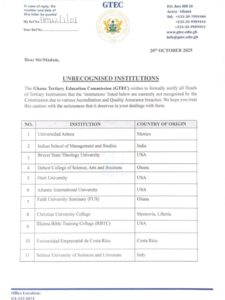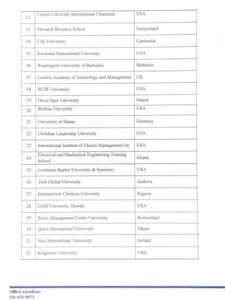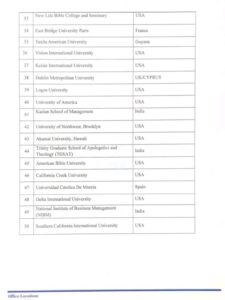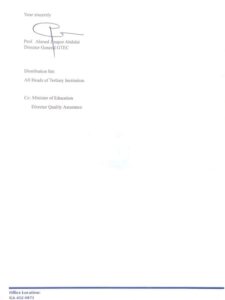The Ghana Tertiary Education Commission (GTEC) has taken decisive action against tertiary schools operating without proper accreditation, issuing a formal notice listing around 50 institutions as unrecognised and emphasising the risks to students who enrol in them. The Commission’s announcement, signed by Director-General Ahmed Jinapor Abdulai on 20 October 2025, highlights systemic concerns about quality assurance and regulatory compliance in Ghana’s higher education sector.
GTEC’s public statement clarified that these institutions are currently “not recognised” due to failure to comply with accreditation and quality assurance standards. Students and the public were strongly advised to “take this caution with the seriousness it deserves” and to refrain from enrolment or engagement with schools on the list. The notice directed that any dealings with affected institutions be carried out at one’s own risk.
This move builds on earlier enforcement efforts by the Commission. In September 2025, GTEC flagged around 149 open-distance learning centres for closure after determining they operated without authorisation and were unfit for purpose. Many of these learning centres were said to be located in church halls, old offices and facilities that lacked core educational infrastructure and accreditation status.
A key concern raised by GTEC and stakeholders is the effect on students who, believing they are pursuing valid programmes, find their credentials unrecognised by employers, professional bodies or for compulsory national service. According to the Public Universities Students’ Association of Ghana (PUSAG), more than 3,500 recent graduates from 22 unaccredited institutions have already been barred from participating in the 2025-2026 National Service Scheme.
Beyond individual repercussions, the larger trend of unaccredited institutions threatens the integrity of Ghana’s tertiary education system. GTEC’s crackdown is therefore seen as essential to preserving standards and ensuring the sector supports economic and social development objectives. The warning also resonates with past GTEC findings that prominent universities still utilise “study centres” that have not been accredited—centres that operate outside the approved institutional framework and create a layer of risk for students.
For prospective students and their families, the message is clear: verify accreditation status through the official GTEC portal, check whether programmes are listed on the accredited institutions page, and avoid institutions appearing on unrecognised lists. Failure to do so may lead to wasted time, financial loss and non-recognition of qualifications.
The announcement also signals pressure on tertiary institutions to align with GTEC’s requirements: proper facilities, governance frameworks, academic staff and oversight mechanisms. Affiliated bodies and industry partners expect that degrees and certificates be credible and robust, especially as Ghana seeks to enhance its higher education standing regionally and globally.
In light of these developments, the broader higher education community will be watching how the institutions respond, whether by seeking accreditation or adjusting programmes to meet standards. For now, the student population faces a crucial decision point: choose recognised institutions or risk investing in qualifications that may not be acknowledged.




School Feeding Programme to Expand to Over 1,000 Pupils in Rural Basic Schools – Coordinator

